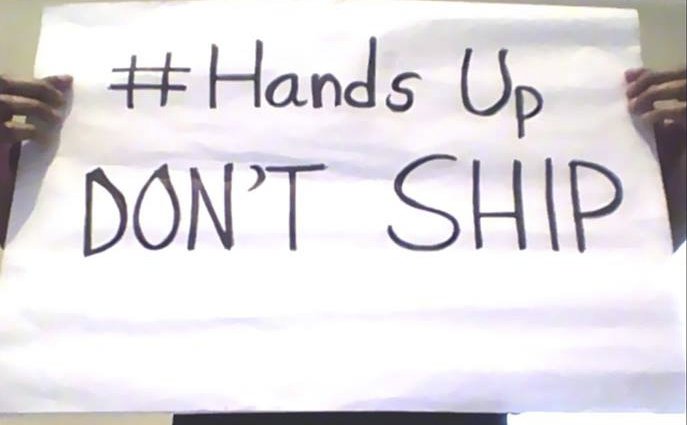

The call for justice continues not only in Ferguson, Mo., but around the United States since the Aug. 9 brutal murder of Michael Brown, the 18-year-old African American who was shot in broad daylight by a white police officer, Darren Wilson. Not since the 1992 Los Angeles rebellion has there been another one like the one that erupted in Ferguson on Aug. 10 and lasted for over a week. And never before has so much national and international scrutiny been paid towards the racist scourge of police terror inside the U.S.
It is a known fact that at least one African-American male on average is killed by the police every 28 hours. But what brought unprecedented attention to Brown’s murder was that eyewitnesses saw and heard him tell Wilson to stop shooting as he tried to surrender with his hands up.
After Brown was shot at least six times, his motionless body reportedly lay in the street for four hours as the police denied any medical attempts to revive him or for any of Brown’s family members to approach him. It was an all-too-familiar racist display of wanton disregard for the lives of Black youth.
The youth uprising in Ferguson, a 67-percent African-American populated suburb of St. Louis, has helped expose the growing militarization of the police, with the armored tanks, chemical warfare, drone surveillance and other hi-tech weaponry provided by the Pentagon.
During the height of the uprising, 155 people were reportedly arrested, the majority of them from St. Louis County, countering the lie put forth by Missouri local and state police that “outside agitators” caused the uprising. The mass rebellion has forced the federal government to investigate ongoing abuse within the Ferguson police department, including the beating and hogtieing of a 12-year-old Black youth and the indiscriminate teargassing of Ferguson residents.
Worldwide condemnation of the brutal repression in Ferguson and the state’s refusal thus far to arrest Wilson for murder has brought about acts of anti-racist, anti-police solidarity from various sectors of society, including labor unions. For example, American Postal Workers Union general officers — Mark Dimondstein, president; Debby Szeredy, executive vice president; and Elizabeth Powell, secretary-treasurer — released a public statement, along with those of other union officials from the Communication Workers of America and the United Food and Commercial Workers, denouncing the killing of Brown. Brown’s mother, Leslie McFadden, is a member of the UFCW.
‘Hands Up, Don’t Ship!’
One of the most dynamic acts of labor solidarity demanding justice for Michael Brown was carried out by part-time United Parcel Service workers in Minneapolis on Aug. 22. According to an Aug. 26 Labor Notes online article entitled, “‘Hands Up, Don’t Ship!’ Minneapolis UPS workers protest shipments to Missouri police,” a dozen UPS workers refused to ship cardboard, steel and plastic shooting-range targets — produced by Law Enforcement Targets — to Missouri law enforcement agencies. The shooting targets show photos of Black men pointing guns. Last year, another line of LET targets called “With no hesitation” showed Black youth and even pregnant teenagers carrying guns. It was discontinued due to public protests.
These low-wage workers explained their stance this way: “Some of us removed the company’s packages from trucks that would deliver them to law enforcement. Others, in solidarity, refused to ferry these packages to their intended trailers.
“Others posed with a sign reading ‘#handsupdontship.’ The phrase ‘hands up, don’t shoot’ has come to symbolize protest over the police shooting of Michael Brown. …
“We decided we could not be silent while our work was contributing to the militarized violence that police are directing at Ferguson residents in the aftermath of Brown’s death.”
The workers explained that LET has contracts with law enforcement agencies around the country, with 10 of those contracts in Missouri. (Read more at tinyurl.com/mea6c55.)
Just as the dockworkers and union activists on the West Coast protested the Zionist massacre in Gaza by preventing the Israeli ship Zim from unloading, the UPS workers’ refusal to ship repressive matériel to Missouri police agencies serves as an admirable example of how demands can translate into direct action. Both acts of solidarity portend what can happen on an even grander scale when labor power is used to build class solidarity at home and abroad, especially with the most oppressed.
Raposo is a Portuguese Marxist analyst, editor of the web magazine jornalmudardevida.net, where this article…
By Alireza Salehi The following commentary first appeared on the Iranian-based Press TV at tinyurl.com/53hdhskk.…
This is Part Two of a series based on a talk given at a national…
Educators for Palestine released the following news release on July 19, 2025. Washington, D.C. Educators…
On July 17, a court in France ordered the release of Georges Abdallah, a Lebanese…
The following are highlights from a speech given by Yemen’s Ansarallah Commander Sayyed Abdul-Malik Badr…